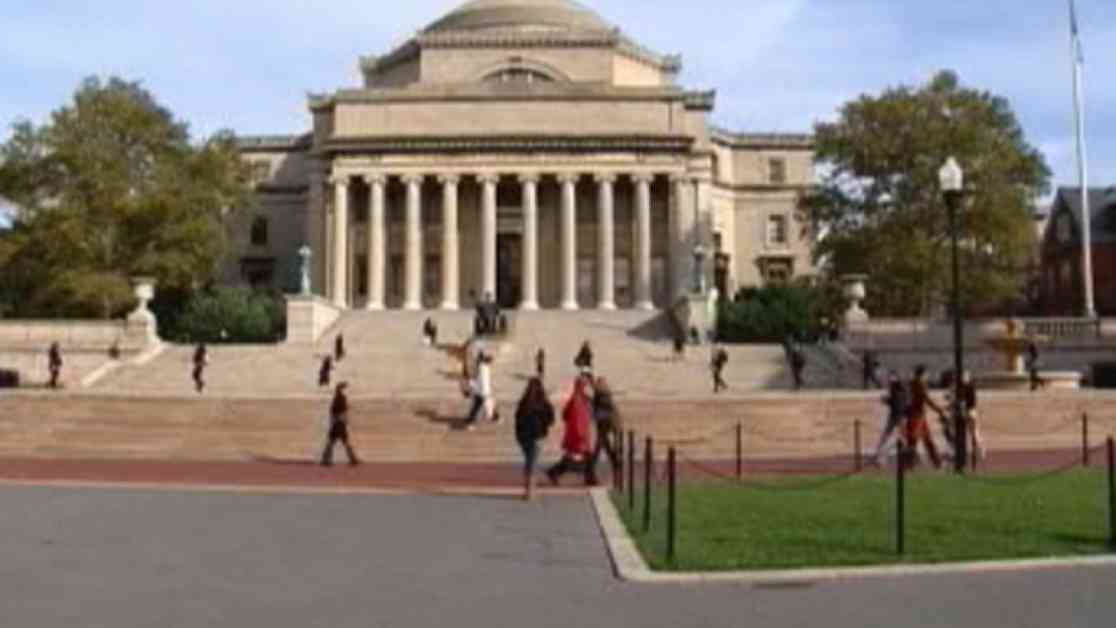Late Friday afternoon, Deputy Attorney General Todd Blanche made a startling announcement from the Justice Department, revealing an ongoing investigation into Columbia University. The focus: whether the esteemed institution was harboring “illegal aliens” on its campus. This revelation comes amid an intensified campaign by the Trump administration to deport foreign students who participated in pro-Palestinian demonstrations at the university last year.
The investigation took a dramatic turn when agents from the Department of Homeland Security executed search warrants at two university residences on Thursday evening. While no arrests were made during the search, the authorities had specific individuals in their sights. By Friday, U.S. officials disclosed significant updates regarding two individuals linked to the protests.
One of these individuals was a Columbia doctoral student from India, whose visa was abruptly revoked by the Trump administration. Faced with impending deportation, the student hastily fled the U.S. on a plane. Meanwhile, a Palestinian woman, who had been arrested during the tumultuous protests on the campus in April, was apprehended by federal immigration authorities in Newark, New Jersey. The charges against her related to overstaying an expired visa.
Deputy Attorney General Blanche, speaking with unwavering conviction at the Justice Department, underscored the investigation as part of a broader initiative to eradicate antisemitism in the nation. In his statement, he elaborated on the collaborative efforts with the Department of Homeland Security to delve into Columbia University’s alleged involvement in sheltering and concealing individuals considered “illegal aliens.”
The pressing question loomed large: What concrete evidence did the authorities possess to implicate the university in wrongdoing? Blanche’s statements left many wondering whether Columbia itself was being accused of “terrorism crimes” or whether individuals affiliated with the protests were under scrutiny.
Following the events on Thursday night, interim university president Katrina Armstrong penned a note to the university community. She expressed profound dismay over the incursion by federal agents onto the campus and the ensuing searches of student living quarters. Armstrong reiterated the institution’s unwavering commitment to upholding the law and fostering an environment where knowledge is revered, and due process is paramount.
The besieged Columbia University had been grappling with escalating pressure from federal authorities in recent weeks. The government’s punitive measures, including the abrupt cancellation of $400 million in federal grants and contracts, underscored the consequences of perceived leniency towards students and faculty critical of Israel’s military operations in Gaza during the protests.
The administration’s stringent demands for reform within the university’s academic and disciplinary framework, fueled by accusations of being “pro-Hamas,” further exacerbated tensions. The threat of permanent cessation of federal funding loomed large, compelling Columbia to navigate uncharted waters in the wake of these allegations.
As the saga unfolded, the arrest of Palestinian activist Mahmoud Khalil, a prominent figure in the protests last spring, cast a long shadow over the university. The subsequent revocation of Indian citizen and Columbia doctoral student Ranjani Srinivasan’s visa, on charges of advocating violence and terrorism, added another layer of complexity to the unfolding narrative.
While federal officials stood by their decision to revoke Srinivasan’s visa, citing unspecified evidence, her legal team vehemently denied the allegations. Srinivasan’s account painted a picture of inadvertent entanglement in protest-related activities, leading to summonses that she omitted from her visa renewal application.
The arrest of Leqaa Kordia in Newark on charges of visa overstay, despite her lack of affiliation with Columbia, underscored the far-reaching implications of the investigations. Kordia’s detention and pending immigration proceedings in Texas marked a troubling chapter in the broader crackdown on visa violations and perceived threats to national security.
In the face of mounting scrutiny and apprehension within the university community, Columbia stood at a crossroads, balancing its commitment to academic freedom with the exigencies of national security and due process. As the Trump administration signaled its intent to revoke more student visas in the days to come, the implications of these investigations reverberated far beyond the hallowed halls of academia.












